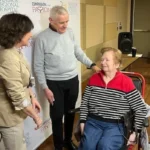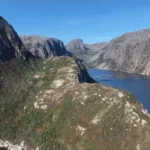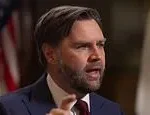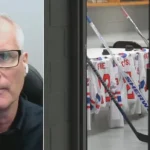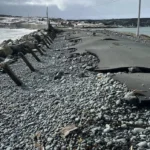[ad_1]

Russian President Vladimir Putin (left) greets Iranian International Minister Abbas Araghchi previous to their talks on the Kremlin in Moscow, Monday.
Alexander Kazakov/Sputnik, Kremlin Pool Photograph through AP
cover caption
toggle caption
Alexander Kazakov/Sputnik, Kremlin Pool Photograph through AP
Israel launched a wave of airstrikes throughout Tehran early Monday, hitting what it referred to as “regime targets and authorities repression our bodies” within the coronary heart of the Iranian capital, together with Evin Jail, infamous for jailing political opponents. The army additionally mentioned it struck the Fordo nuclear facility, already broken by U.S. strikes over the weekend, to hinder entry routes to the positioning.
The Israeli army mentioned its warplanes, guided by intelligence, hit command facilities linked to Iran’s Islamic Revolutionary Guard Corps (IRGC), together with the Basij headquarters and the Alborz Corps, which oversee inside safety.

Protection Minister Israel Katz mentioned the strikes had been a response to Iranian missile fireplace and vowed to proceed hitting “regime targets.”
The Iranian judiciary denied Israeli studies of unrest inside Evin Jail following the strikes, calling them “rumors from Mossad media,” referring to Israel’s spy company, and mentioned the state of affairs was below management.
The IRGC mentioned it responded with a brand new barrage of ballistic missiles and drones as a part of what it referred to as the “twenty first wave” of its counterattacks.

In the meantime, in Moscow, Russian President Vladimir Putin met with Iranian International Minister Abbas Araghchi and publicly condemned the U.S. strikes on Iran’s nuclear websites. Putin accused the U.S. of “unprovoked aggression” and pledged to assist Iran. The assembly underscored rising alignment between Tehran and Moscow amid escalating regional tensions.
In a briefing with reporters, Israeli former Mossad official and Iran knowledgeable Sima Shine supplied a combined verdict on the U.S. airstrikes concentrating on three of Iran’s key nuclear websites, together with Fordo, Natanz and Isfahan.

“It is significantly better than what we thought it might be,” she mentioned, however then added, “I do not suppose it is full destruction of the venture.”
Shine instructed Iran could also be hiding enriched uranium and superior centrifuges elsewhere, and will construct a bomb in secret.
NPR’s Daniel Estrin contributed reporting from Tel Aviv.
[ad_2]



